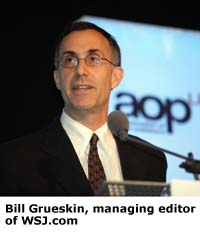 I'm on site at the 2005 Association of Online Publishers conference at the Park Lane Hilton in London. There's so much going on that I'm going to cover highlights as they happen. (Neatly avoids use of the 'b' word - fear not, old-schoolers!)
I'm on site at the 2005 Association of Online Publishers conference at the Park Lane Hilton in London. There's so much going on that I'm going to cover highlights as they happen. (Neatly avoids use of the 'b' word - fear not, old-schoolers!)Don't compromise online, says AOP chair
"The web is not a cannibalistic threat but an opportunity to complement traditional media business," said Bill Murray, opening the conference. He's managing director of group information strategy at Haymarket and chair of the AOP.
"We need to avoid compromises and deliver websites that are as strong as they could be - rather than protecting certain content for print products. These products must have an online presence that reflects and enhances their position."
Trust is pivotal to navigating content online, making the role of conventional editors even more significant. And a "massive opportunity" for publishers, said Mr Murray.
WSJ's Bill Grueskin on paid content
No quick fixes from Bill Grueskin, managing editor of the Wall Street Journal.
WSJ is well respected for its successful paid content model and claims to be the world's largest paid subscription site. But WSJ has been very consistent, developing its paid service from the outset. It has succeeded because of its wealthy readership and niche subject matter; many readers rely on WSJ information for their livelihoods.
Applying this model to a mass market publication would be a much tougher hurdle, said Mr Grueskin.
"You need to start thinking of readers as subscribers - paying you with their time, if not money.
"It's hard to overestimate the value of the relationship with our readers. Our readers are also our customers, and regularly tell us what they like and what they don't like - and they want and expect a response from us.
"They are paying, so they have a vested interest in the site and its success."
Isolated by the payment barrier
He admitted that by charging for its content, WSJ risked becoming irrelevant because it cuts itself off from the online conversation. Bloggers are unwilling to link to sites that require registration or a paid subscription, and search engines also struggle to pick up stories behind a payment barrier.
WSJ tries to counter this by publishing some free stories on the home page and in an RSS feed, and by sending URLs directly to relevant bloggers.
Imminent relaunch to meld print and web
WSJ is to relaunch its European and Asian print newspapers as a compact edition on 17 October with a new design that heavily promotes web content. The sites will include translated news content from five external European and five Asian specialist news websites.
The idea is to create one seamless form from the web and print editions: "The ease and quality of the newspaper with the immediacy and depth of online news - that's what we hope to bridge."
Echoing Bill Murray, he said that a website must be far more than a pale reflection of its print partner if it is to succeed.
"The issue of paid or free content is less important than how a publication treats its readers," he said.
"But I can't show you some kind of perfect bubble of paid content. Many of us have predecessors that have locked us into models we now have, and if you're running a free site now it would be very hard to switch to a paid model.
"You would just confuse and irritate your readers because you have trained them to believe that stories deserve to be free."
He quoted one mafia godfather (either Don Corleone or Tony Soprano): "This is the life we have chosen."
"And we all know what happens when one of the mafioso tries to leave the fold - it never goes well."
Free daily newsletter
If you like our news and feature articles, you can sign up to receive our free daily (Mon-Fri) email newsletter (mobile friendly).
Related articles
- The Wall Street Journal launches archived content newsletter
- From problem solver to innovator: how bridge roles have evolved in newsrooms
- Robin Kwong, new formats editor of The Wall Street Journal, on evolving bridge roles
- Tip: Make the most of your comment section
- Ofcom: BBC One, ITV and Facebook are the most used news sources in the UK. In that order









